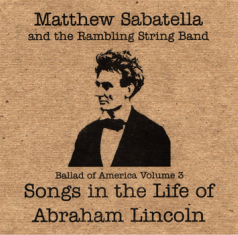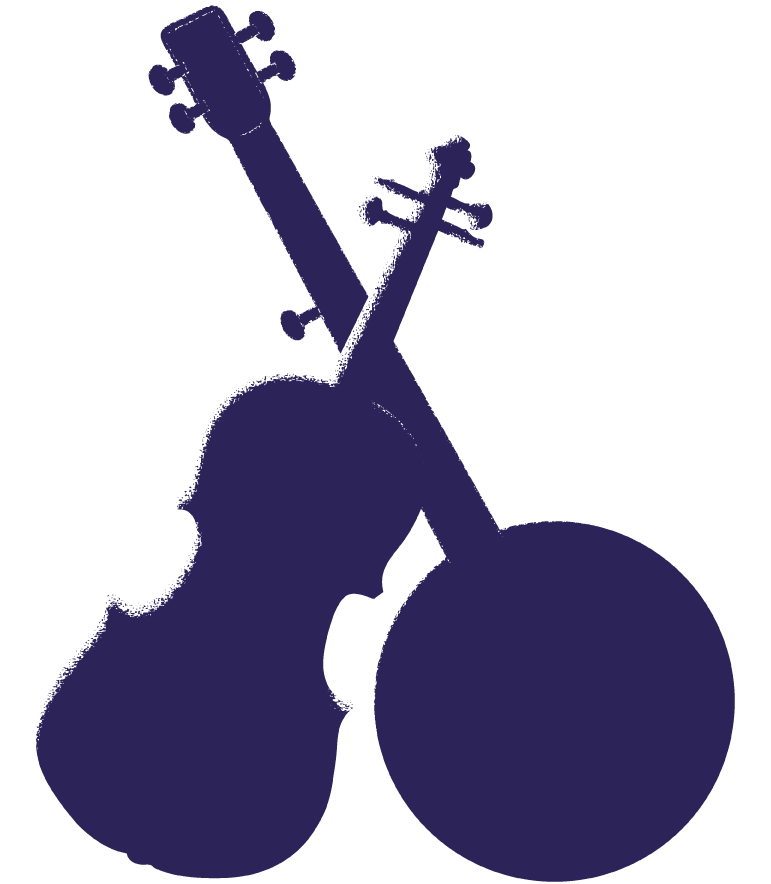

Overview
This is the third album in the Ballad of America series, which tells the story of the United States through traditional folk songs. Songs in the Life of Abraham Lincoln celebrates the 16th president of the United States through the music he cherished. Abraham Lincoln was a man of remarkable determination, compassion, honesty, humor, and melancholy. Matthew Sabatella and the Rambling String Band’s traditional acoustic arrangements of his favorite folk and popular songs enable twenty-first century listeners to better understand the man himself and the times in which he lived.
This is the soundtrack to Abraham Lincoln’s life.
The compact disc includes booklet containing historical background for each song (reprinted below).
Streaming
Apple Music
Spotify
YouTube
Reviews
The music illuminates, in ways delightful and touching, aspects of (Abraham Lincoln’s) complex character. Sabatella and the group add colorful energy to the selections.
Paul Shackman – Booklist
The charm remains intact on his third installment in the series, Ballad of America Volume 3: Songs in the Life of Abraham Lincoln. Honest Abe apparently didn’t have an iPod, but Sabatella’s done his usual thorough research. He’s documented Lincoln’s link to this music via extensive liner notes containing historical anecdotes and (of course secondhand) quotes from those who were there.
Lee Zimmerman – New Times Broward/Palm Beach
Album Notes
Click the song title to visit the Ballad of America page with lyrics, more information, and streaming links.
1. Barbara Allen
Abraham Lincoln was born to Thomas and Nancy Lincoln on February 12, 1809, in a one-room log cabin on a 300-acre farm in Hardin County, Kentucky. He once said, “All that I am or hope to be, I owe to my angel mother.” A hardworking and loving mother, Nancy was prone to frequent spells of sadness, as her son Abraham would be. Like many pioneer women, she loved and sang tragic ballads from the British Isles that had been carried to the New World by early European settlers.
“Barbara Allen,” which dates back at least to the 17 th century, was perhaps the most commonly sung of those ballads in early America. It is claimed that, in later years, Lincoln identified it as his mother’s favorite song. The song is interpreted here on a mountain dulcimer, an American instrument rooted in Old World designs that was likely ringing through the Kentucky hills during Lincoln’s childhood.
2. Old Sister Phoebe
In the fall of 1816, after chaotic land laws caused the Lincolns to lose three different farms in Kentucky, Thomas and Nancy Lincoln moved with their two children – Sarah, 9, and Abraham, 7 – to southern Indiana. Abraham became skilled with the plow and axe as he assisted his father in the work that had to be done to survive on the frontier. In October of 1818, when Abraham was 9 years old, his mother, Nancy Hanks Lincoln, died of milk sickness.
Nancy had encouraged young Abraham to read and explore the world through books, which he did voraciously. Although the demands of life on the frontier left little time for formal schooling, Abraham educated himself and could often be seen carrying a book as well as an axe. As he grew from a boy to a young man, Abraham was popular at community gatherings such as corn shuckings, logrollings, grubbings, and play parties. Play parties were a popular form of entertainment in frontier communities, especially ones in which religious beliefs did not permit “dancing” and considered the fiddle to be the “devil’s instrument.” Though based on European and English antecedents, play parties were truly an American phenomenon.
Abraham’s favorite play-party game was “Old Sister Phoebe,” in which boys and girls join hands and circle around one girl in the center of the ring who holds in her hands a hat or coonskin cap. In keeping with the lyrics to the song, she places the cap on a boy’s head and kisses him. She then takes the boy’s place in the circle and he moves to the center. The game and song sometimes went on for hours.
“Old Sister Phoebe,” as recorded here, includes a Jew’s harp, an instrument Lincoln once told a group of schoolchildren that he played as a boy.
3. Old Dan Tucker
In 1830, when Abraham was 21 years old, the Lincolns moved to Macon County, Illinois. A year later, as the family was relocating to Coles County, Abraham would go his own way to New Salem. Between Macon County, New Salem, and Springfield, Abraham would spend 31 years of his life in Illinois. He was a shopkeeper, surveyor, and postmaster. He taught himself law and traveled the 12,000 square mile Eighth Judicial Circuit on horseback. He met and married Mary Todd, raising four sons together. He honed his political skills in the state legislature, served a single term in Congress, and skillfully defended his position against the expansion of slavery in a series of debates with one of the most prominent politicians of the time, Senator Stephen Douglas.
Coinciding with Lincoln’s rise to national prominence between the 1830s and 1850s was the rise of blackface minstrelsy. Minstrel troupes laid the foundation for the formal entertainment industry in the United States, touring all over the country and eventually the world. Minstrel shows were music, dance, and comedy shows performed primarily by white people who had their faces blackened with burnt cork. While reducing black people to unintelligent, comical, and frivolous caricatures, minstrel shows enabled white performers and audiences, in a society based on institutionalized racial segregation and cruelty, to indulge their fascination with a culture to which they may have had little or no exposure.
Abraham Lincoln, the man who was to emancipate three and a half million slaves, was no exception in his love for minstrel shows and songs. He would pass up a chance at almost any other type of entertainment to attend a minstrel performance. “Old Dan Tucker” is one of the songs written for the minstrel stage to which Lincoln showed a preference. It was written by one of the first and greatest of America’s blackface minstrels, Daniel Decatur Emmett. The song is presented here with traditional minstrel show instrumentation that includes banjo, fiddle, bones (carved from cow rib bones), and tambourine.
4. Lincoln and Liberty
At the 1860 Republican convention in Chicago, Abraham Lincoln won his party’s nomination for president of the United States. In 19 th century America, hardly a presidential candidate won an election without having his name linked to liberty in a song. Jesse Hutchinson, Jr., of New Hampshire’s famous Hutchinson Family Singers, wrote the lyrics to Lincoln and Liberty and set them to the tune of Rosin the Bow , an Irish melody that is one of the most parodied in folk music. The Hutchinson Family Singers traveled the country singing anti-slavery and pro-Union songs, frequently at Lincoln’s campaign appearances, and later, in the White House.
“Lincoln and Liberty” became Lincoln’s official campaign song in 1860 and was published in the book The “Hutchinson’s Republican Songster,” which was used at rallies everywhere. On November 6, 1860, Abraham Lincoln was elected the sixteenth president of the United States. He bid farewell to friends and supporters in Springfield on February 11, 1861, and boarded a train bound for Washington. By the time he took office on March 4, 1861, his publicly stated belief that slavery was “a moral, a social, and a political wrong” prompted the lower South to secede from the Union and form the Confederate States of America in an effort to protect their “peculiar institution.” When Confederate forces attacked a United States military installation at Fort Sumter in Charleston, South Carolina on April 12, 1861, the Civil War had begun.
5. Nobody Knows the Trouble I’ve Seen
While Lincoln had always opposed slavery, he made it clear that saving the Union was his overarching goal in the Civil War. With opinion divided in the North as to whether or not emancipation was a good idea, Lincoln feared that it could cause some Northern border states to join the secession. When he became convinced that freeing slaves in the states that were in rebellion would significantly damage the Confederate war efforts, he issued the Emancipation Proclamation, invoking “military necessity.” After taking pen in hand to sign the document on January 1, 1863, Lincoln stated, “I never, in my life, felt more certain that I was doing right, than I do in signing this paper.”
Abraham, his wife Mary, and their son Tad spent summers from 1862 to 1864 at the Soldiers’ Home, a cottage on a hilltop about four miles from Washington. After escaping slavery in Maryland, Mary Dines became a cook at the Soldiers’ Home, living in a nearby camp for escaped slaves. She claimed that, on at least one occasion, the Lincolns visited the camp, where she and others prayed and sang spirituals. Dines recalled that, after singing “Nobody Knows the Trouble I’ve Seen,” she saw the president “wiping the tears off his face with his bare hands.”
6. The Battle Cry of Freedom
Though he had no formal military training, President Lincoln quickly rose to become a very skilled and knowledgeable commander. Since childhood, he possessed both the will and ability to master any subject to which he applied himself. As the incoming commander in chief, he applied his determination and skill to mastering the intricacies of military strategy. Ultimately, Lincoln proved to be a more hands-on commander in chief than any preceding president.
On July 2, 1862, President Lincoln issued a call for 300,000 volunteers to enter military service. Inspired by the call, composer George F. Root wrote “The Battle Cry of Freedom.” The song was first introduced at a war rally in Chicago on July 24, 1862, and was soon sung by millions of Americans from New York to California. There are many anecdotes in diaries, reminiscences, and newspapers concerning the inspirational effects of the song. One such claim from a Union soldier states that the song “put as much spirit and cheer into the camp as a splendid victory.”
7. Tenting on the Old Camp Ground
One day, shortly after a disastrous loss for the Union army, President Lincoln and General Carl Schurz sat in the White House gravely discussing the recent events. When night fell, the General went to the piano in an adjoining room and softly played some of the popular songs of the day. The President listened silently in the semi-darkness. When Schurz finished, Lincoln thanked him warmly and expressed how deeply he had always been affected by music of a sentimental nature.
Among the songs played by General Schurz that evening was “Tenting on the Old Camp Ground.” The song reflects the public’s changing taste in Civil War music, which, as the fighting dragged on, was drifting away from such songs as “The Battle Cry of Freedom.” “Tenting on the Old Camp Ground” was written in 1863 by a young New Hampshire musician named Walter Kittredge.
The inspiration for this moving plea for peace came while Kittredge was preparing to answer the draft call he had received to fight in the Union army. The Civil War was the first American war to have a general military draft, and men were drafted to fight on both sides of the conflict. It turned out that Kittredge was unable to serve in the army due to a childhood bout with rheumatic fever, but the song was an instant success, demonstrating tremendous and lasting appeal with civilians and soldiers alike.
8. Home Sweet Home
Lincoln and his wife Mary frequently invited musicians to perform in the Red Room of the White House. Shortly after the death of their third son, Willie, on February 20, 1862, the Lincolns were visited by the nineteen-year-old opera singer Adelina Patti. Mary Todd was brought to tears by Patti’s rendition of The Last Rose of Summer. Patti admitted in her memoirs that the song, with its theme of loneliness and death, was an “awkward choice” to sing to a couple who had recently lost a child. President Lincoln broke the tension by requesting Home Sweet Home. Patti obliged and sang the song, accompanying herself on the piano. Patti wrote in her memoirs, “when Mr. Lincoln thanked me his voice was husky and his eyes were full of tears.”
“Home Sweet Home” was written by American lyricist John Howard Payne and English composer Sir Henry Bishop for an opera that was first produced in London in 1823. The song became hugely popular throughout the United States, and was a favorite of both Union and Confederate soldiers.
9. Dixie’s Land
Although known as a Southern anthem, Dixie’s Land was written for the minstrel stage by Daniel Decatur Emmett in New York City. The song was so popular in the South that it became generally accepted as the rallying song of the Confederacy. Lincoln loved the song since he first heard it at a show by the Rumsey and Newcomb Minstrels in Chicago in 1860. According to a fellow attorney who attended the show with him, after Dixie’s Land was played, Lincoln clapped and shouted “Let’s have it again! Let’s have it again!”
With the end to the Civil War, which had lasted four years, seemingly in sight, President Lincoln gave his Second Inaugural Address on March 4, 1865. He proclaimed, “With malice toward none; with charity for all; with firmness in the right, as God gives us to see the right, let us strive on to finish the work we are in; to bind up the nation’s wounds.” With that idea in mind, on April 8, 1865, the day before Confederate commander Robert E. Lee surrendered to Union General-in-Chief Ulysses S. Grant, Lincoln requested that a military band on board the River Queen play “Dixie’s Land,” the song to which nearly all of the Southern attacks had been conducted. According to a French writer who accompanied him, Lincoln said, “That tune is now Federal property and it is good to show the rebels that, with us in power, they will be free to hear it again.”
10. Twenty Years Ago
On April 14, 1865, President and Mrs. Lincoln attended the evening performance of Our American Cousin at Ford’s Theatre in Washington. A few minutes after 10:00 PM, angered by the defeat of the Confederacy and Lincoln’s proposal to extend voting rights to emancipated slaves, American stage actor John Wilkes Booth entered the State Box where Lincoln was seated and shot him in the back of the head. Lincoln died the next morning.
According to Lincoln’s long-time friend Ward Hill Lamon, no song “touched his great heart as did the song of “Twenty Years Ago.” Many a time, in the old days of our familiar friendship on the Illinois circuit and often at the White House when he and I were alone, have I seen him in tears while I was rendering, in my poor way, that homely melody.”
Journalist and frequent visitor to the White House, Noah Brooks, wrote, “I remember that, one night at the White House, when a few ladies visiting the family were singing at the piano-forte, he asked for a little song in which the writer describes his sensations when revisiting the scenes of his boyhood, dwelling mournfully on the vanished joys and the delightful associations of forty years ago (sic). It is not likely that there was anything in Lincoln’s lost youth that he would wish to recall; but there was a certain melancholy and half-morbid strain in that song which struck a responsive chord in his heart. The lines sunk into his memory, and I remember that he quoted them, as if to himself, long afterwards.”
On May 4, 1865, Abraham Lincoln was laid to rest in Springfield, Illinois, where he had lived twenty years earlier.
